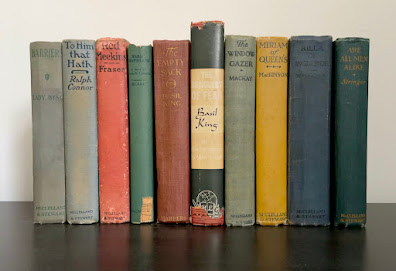More Joy in Heaven
Morley Callaghan
New York: Random House, 1937
278 pages
It's been decades since Intro to CanLit II, my second introduction to Canadian literature. Like Intro to CanLit I, the course covered four works; all novels, all written by men. Hugh MacLennan's The Watch That Ends the Night was my favourite, but I do remember liking They Shall Inherit the Earth. We were told that its author, Morley Callaghan, was “perhaps the most unjustly neglected novelist in the English-speaking world.” Here our professor was quoting Edmund Wilson. He made much of this, but at twenty the name Edmund Wilson meant nothing to me.
They Shall Inherit the Earth (1935) sits in the middle of a run of three novels considered Callaghan's best. The first, Such is My Beloved (1934), involves a handsome young priest – in fiction all young priests are handsome – who befriends two prostitutes. It vies with the third, More Joy in Heaven, as Callaghan's best known novel. They Shall Inherit the Earth is not nearly so well known. You can understand why. They Shall Inherit the Earth is a story about a father and son who, to quote the cover of my old NCL edition (right), are "forced to re-examine the nature of individual conscience and responsibility." It has no sex workers, nor does it have a bank robber.
More Joy in Heaven has both.
Its protagonist, Kip Caley, isn't a prostitute, but he had robbed banks – so many banks that he was sentenced to life and twenty lashes. In prison, Caley underwent a transformation of some kind. There's no suggestion that he found God, though Caley did find Father Butler, the prison chaplain. Somehow, the worst man in Canada becomes the most beloved.
Caley returns to his hometown, Toronto, where he takes a job at a hotel and nightclub that caters to sporting types. The senator arranged it all. A greeter, a position in which he never feels comfortable, all Caley has to do is welcome patrons. Everyone wants to meet the reformed man; it's great for business. Kip Caley is the toast of the town, but as months pass he seems more the man of the hour.
More Joy in Heaven is a good novel, but the greatest fiction is found on its copyright page:
Contemporary reviewers were not fooled.
 |
| The Globe, 25 May 1936 |
The Big Red Fox, Peter McSherry's 1999 Arthur Ellis nominated biography of Ryan, is recommended.
More Joy in Heaven is also recommended, as is They Shall Inherit the Earth.
Object: I purchased my copy, a first edition, in 1989 from a cart at the Westmount Public Library. Sadly, it lacks the dust jacket (above), but then what can you expect for $1.00.
Access: The novel remains in print, though I suspect the copies have been sitting in Penguin Random House for over a decade now. What's offered features the 2007 New Canadian Library cover design... and, well, the New Canadian Library is long dead.
 |
| The 1960 and 2009 NCL editions. |
Why those novels, I wonder?






















































